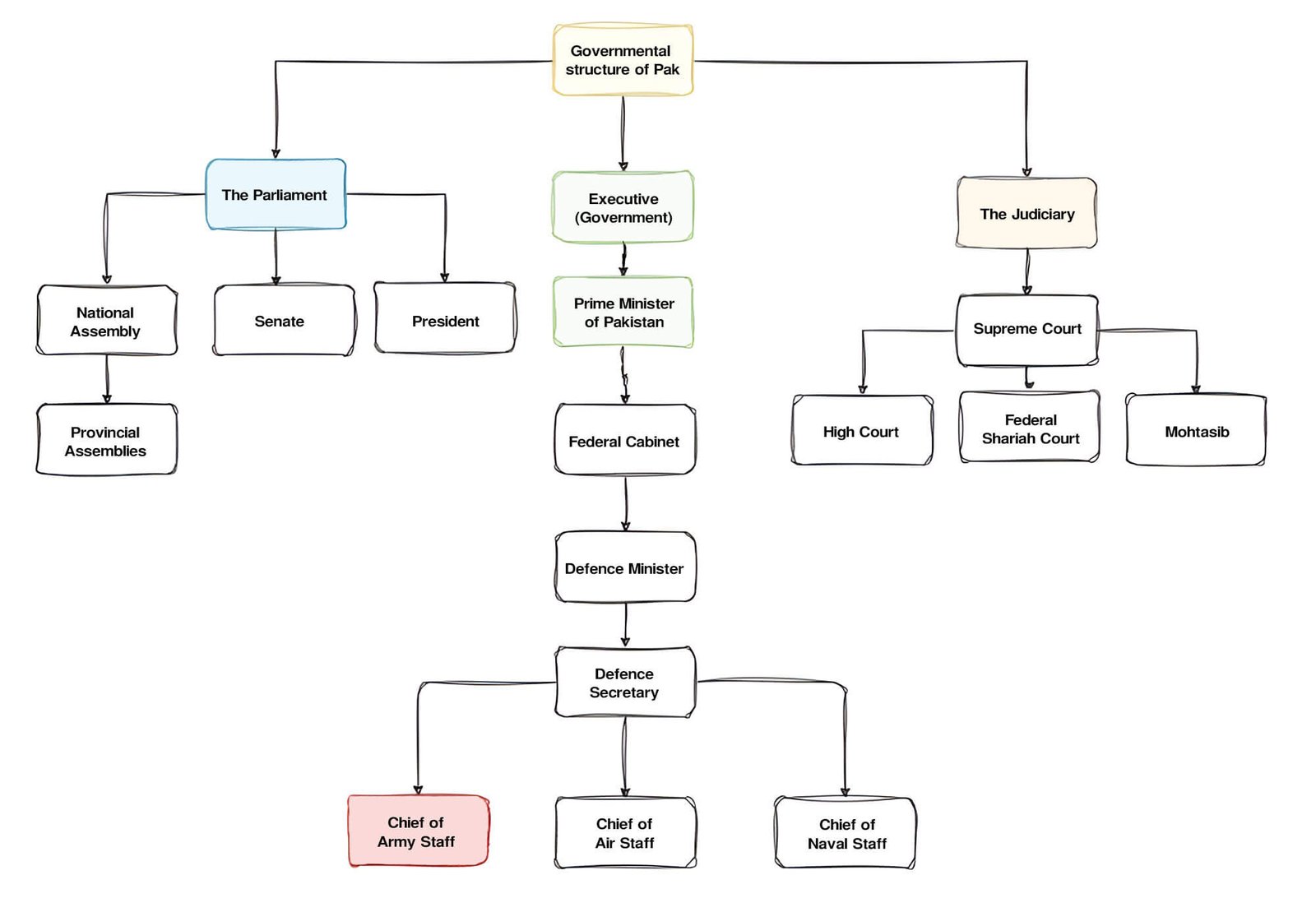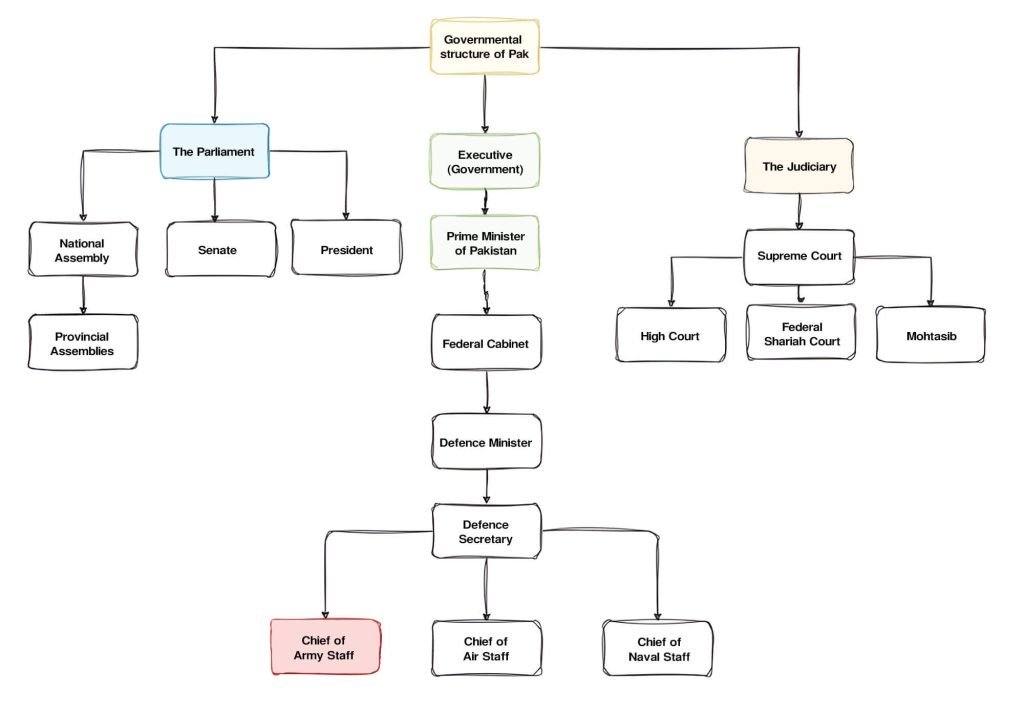About Pakistan
Pakistan state institutions, legislative and regulatory bodies
An introduction to Pakistan state institutions, legislative and regulatory bodies that govern the country.

At the time this article was written, Pakistan was, on paper, an Islamic Republic, governed under a parliamentary democracy. It has several key state institutions that play different roles in the governance and functioning of the country, and collectively to the security, and regulatory framework of Pakistan. This article will capture some of the most important state institutions of Pakistan.
President of Pakistan
According to the Constitution of Pakistan, the president is the head of the state and is responsible for representing the unity of the Republic. The President is the nominal head of the executive and the supreme commander of the armed forces. Moreover, the President is elected by the members of an electoral college consisting of the members of
1. The members of both houses (the National Assembly and the Senate)
2. The members of the provincial assemblies
The Constitution of Pakistan prohibits the president from directly running the government. Instead, the executive power is exercised on his behalf by the prime minister, who must keep him informed on all matters of internal and foreign policy, as well as all legislative proposals.
Prime Minister of Pakistan
The prime minister is the head of the government and is responsible for administration and policy making. The executive authority is vested in the prime minister and his chosen cabinet, and he/she is often the leader of the party or the coalition with a majority in the lower house of the Parliament of Pakistan, the National Assembly, where he serves as Leader of the House. The Prime Minister is elected by the votes of the majority of the total membership of the National Assembly.
The Parliament of Pakistan
The Parliament of Pakistan is the supreme legislative body of the Islamic Republic of Pakistan. The parliament composes of the President of Pakistan, and the two houses; the National Assembly and the Senate.
National Assembly of Pakistan
The national assembly is the lower house of the Parliament, where elected representatives debate and pass legislation. According to Article 51 (1) and 3(a) of the Constitution of the Islamic Republic of Pakistan, there are 336 seats in the National Assembly of Pakistan:
- 226 general seats are directly elected by an adult universal suffrage and a first-past-the-post system to represent their respective constituencies
- 70 seats reserved seats for women and religious minorities from all over the country. These seats are allocated to the political parties as per their representation in the 266 general seats
| Province / Area | General Seats | Women Seats | Non-Muslim | Total Seats |
| Balochistan | 16 | 4 | – | 20 |
| Khyber Pakhtunkhwa | 45 | 10 | – | 55 |
| Punjab | 141 | 32 | – | 173 |
| Sindh | 61 | 14 | – | 75 |
| Federal Capital | 3 | – | – | 3 |
| Others | – | – | 10 | 10 |
| Total | 266 | 60 | 10 | 336 |
The Senate of Pakistan
The senate is the upper house of the Parliament, representing the provinces and territories. As of 2023, It has a maximum membership of 100, of which 92 are elected by the provincial legislatures using single transferable vote. Four represent the Federal Capital and another four are representing former Federally Administered Tribal Areas (now part of Khyber Pakhtunkhwa), until membership expiration in 2024. The members of the senate sit for a six year term, with half of the house up for election every three years.
| Provinces / Territories | General | Technocrats / Ulema | Women | Non-Muslims | Total |
| Sindh | 14 | 4 | 4 | 1 | 23 |
| Punjab | 14 | 4 | 4 | 1 | 23 |
| Balochistan | 14 | 4 | 4 | 1 | 23 |
| KP | 14 | 4 | 4 | 1 | 23 |
| Federal | 2 | 1 | 1 | – | 4 |
| FATA | 4 | – | – | – | 4 |
| Total | 62 | 17 | 17 | 4 | 100 |
Supreme Court of Pakistan (SCP)
The Supreme Court is the highest judicial authority in the country, responsible for interpreting the Constitution of Pakistan and ensuring justice. In Pakistan’s judicial system, the Supreme Court is the final arbiter of legal and constitutional disputes as well as final interpreter of constitutional law, and the highest court of appeal in Pakistan. This makes SCP one of the most important state institution of Pakistan.
The Supreme Court is composed of the Chief Justice of Pakistan, sixteen justices and two ad hoc who are confirmed to their appointment by the President upon their nominations from the Prime Minister’s selection, based on their merited qualifications. Once appointed, justices are expected to complete their designated terms until their retirement at the age of 65, or unless their term is terminated through resignation or impeachment by the Supreme Judicial Council.
The Federal Cabinet
The federal cabinet is a formal body that comprises of federal ministers and assists the Prime Minister in policy-making and administration. They are chosen and led by the Prime Minister.
The State Bank of Pakistan (SBP)
The State Bank of Pakistan is the central bank responsible for monetary policy and regulating the financial sector.
The Armed Forces of Pakistan
The armed forces is a state institution include the Army, Navy, and Air Force, and are, according to the Constitution of Pakistan as well as their oath, responsible for national defence.
Election Commission of Pakistan (ECP)
The ECP is (supposedly) an independent constitutional body responsible for organizing and conducting elections at the national and provincial levels. Legally, it is bound to ensure free, fair, and transparent elections.
National Accountability Bureau (NAB)
The NAB is an anti-corruption institution of Pakistan tasked with investigating and prosecuting corruption cases.
Higher Education Commission (Higher Education Commission)
The HEC is responsible for overseeing higher education institutions in Pakistan.
Federal Investigation Agency (FIA)
The FIA is a federal law enforcement agency that investigates and combats various forms of transnational and organized crime, including immigration offences, cybercrimes, and human trafficking.
Federal Board of Revenue (FBR)
The FBR is the federal agency responsible for collecting taxes, customs duties, and other federal levies in Pakistan. It plays a crucial role in the country’s fiscal management.
National Database & Registration Authority (NADRA)
NADRA is responsible for maintaining the national database of citizens, issuing Computerized National Identity Cards (CNICs), and managing the registration of individuals.
Pakistan Electronic Media Regulatory Authority (PEMRA)
PEMRA regulates and licenses electronic media in Pakistan, including television and radio. It ensures that media content adheres to ethical and legal standards.
Law Enforcement Agencies (LEAs)
This term collectively refers to various law enforcement bodies operating at the federal and provincial levels, including police, Rangers, and other security forces. They are responsible for maintaining law and order.
Inter-Services Intelligence (ISI)
ISI is the premier intelligence agency of Pakistan, primarily responsible for providing national security and intelligence assessments to the government. It operates under the jurisdiction of the military.
The governmental structure of Pakistan

Note: The details of the state institutions of Pakistan and their roles described above are as per the Constitution of Pakistan. However, throughout Pakistan’s history, these state institutions have often violated their oaths, either trespassed their legal mandate or have fallen short. As a result, the relationship between these state institutions and the people of Pakistan has been badly frastuctured and lacks trust.
